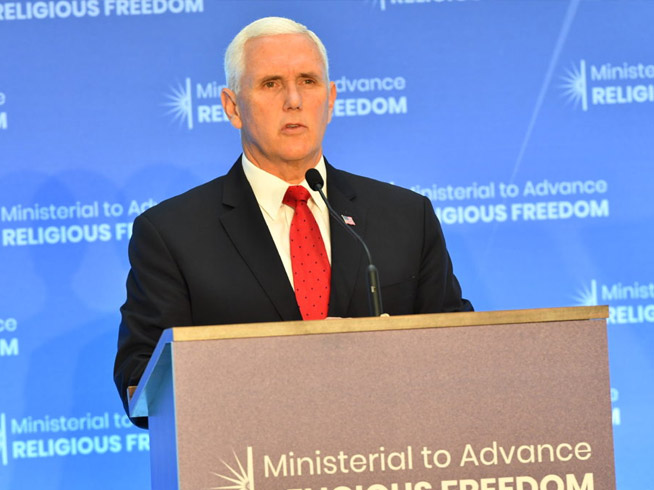Delegations from more than 80 countries attended the inaugural Ministerial Religious Freedom Summit held at the U.S. State Department at the end of July, including Egypt, Indonesia, Iraq, Kazakhstan and Uzbekistan. Christian persecution featured prominently in discussions at the three-day conference, but leading U.S. politicians did not condemn some of the worst abusers of religious freedom. Significantly, the U.S. Vice President and Secretary of State also failed to highlight the extent of the persecution of Christians in a number of Muslim-majority countries.

U.S. Secretary of State Mike Pompeo praised the Gulf states which he said had “been wise to permit the construction of places of worship like churches and temples, thus becoming an even more attractive destination for international investment.” While Bahrain’s monarchy has in the past allowed church construction, no non-Muslim public religious buildings are permitted in Saudi Arabia and a story widely circulated in May 2018, which claimed the Kingdom had agreed a deal with the Vatican to allow the construction of church buildings was later dismissed as fake news . Previously, the Grand Mufti of Saudi Arabia has called for the destruction of all church buildings on the entire Arabian Peninsula. Christian converts in the country legally face the death penalty for apostasy.
Pompeo also commended Uzbekistan following statements by Uzbek politicians that the country “stands ready for a broad international cooperation in this sphere of religious freedom.” Christians in Uzbekistan still face draconian restrictions on church registration that make it practically impossible to register, while believers can face heavy fines if they meet for worship in private homes.
Vice President Mike Pence, speaking on the final day of the conference, notably did not condemn the impact of “blasphemy” laws on Christians in Muslim-majority Pakistan or Indonesia, but did single out Iran, Russia, North Korea and China. He also made special mention of Andrew Brunson’s case, an American pastor in Turkey, who was imprisoned in 2016 and recently released to house arrest after U.S. diplomatic pressure.
The conference’s declaration that “Every person everywhere has the right to freedom of thought, conscience, and religion … [and to hold] any faith or belief, or none at all, and enjoys the freedom to change faith” is a welcome affirmation of the principle of religious freedom. But U.S. criticism of religious freedom must not only be confined to countries engaged in diplomatic disputes with the U.S. The failure to condemn or bring to the world’s attention the plight of Christians in a number of Muslim-majority countries is a glaring omission, which suggests U.S. politicians are reticent to call out violations of religious freedom in countries with close ties to the U.S.

